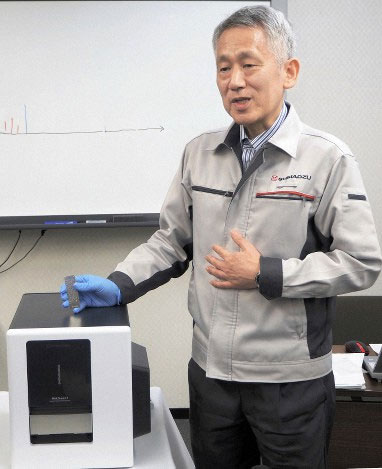Nobel laureate scientist makes the world's smallest mass spectrometer
The world's smallest mass spectrometer is made by a Nobel laureate in 2002 and is expected to play an important role in pharmaceutical research.
At the press conference on May 29, Mr. Koichi Tanaka - won the Nobel Prize in 2002 - introduced the world's smallest mass spectrometer named MALDImini-1 invented by his colleagues at Shimadzu Corporation (Japan).

Mr. Koichi Tanaka at the press conference introduced the MALDImini-1 machine - the world's smallest mass spectrometer - (Photo: Mainichi).
Shimadzu confirmed that the device will be used in bio-pharmaceutical research. This is also the first time the enterprise has developed this product since the establishment of the laboratory in 2003.
According to Mainichi, the mass spectrometer is used to measure macromolecular dimensions such as proteins. The mass spectrometry method requires high voltage power, making it difficult to design compactly. Currently, the smallest mass spectrometer is as big as a refrigerator.
Meanwhile, MALDImini-1 is only equal to A3 paper and weighs 25kg. According to the research team, when putting the sample into the machine, it takes only 5 minutes to have the necessary parameters.
"I believe that if researchers can easily confirm information and discover new things with convenient equipment, they will have more motivation," Mr. Tanaka said during the press conference.
Scientist Tasuko Honjo, who won the Nobel Prize in Physiology and Medicine in 2018, highly appreciated MALDImini-1: "The mass spectrometry method is essential for even the most basic research activities. From now on I want to see this device widely used in the medical industry ".
- Wikipedia's Nobel laureate refused to set up a site because it was not popular
- The oldest Nobel laureate died
- Interesting numbers about the Nobel Prize
- The new detector incorporates a laser head with a mass spectrometer
- The life of a Nobel laureate is boycotted by employees
- Nobel Prize winner of Physics to Vietnam
- Explaining the phenomenon of Hungary
- Detecting the youngest and smallest mass dwarf in the vicinity of the Sun.
- Chinese scientist sues the Nobel Council
- Nobel Economics: Americans overcome hattrick!
- A scientist who has been awarded the Nobel Prize for Medicine has died
- 7 upcoming Nobel Prize winners in Vietnam
 The US company is about to build a supersonic passenger plane of 6,000km / h
The US company is about to build a supersonic passenger plane of 6,000km / h Japan develops avatar robot as in fiction film
Japan develops avatar robot as in fiction film Australia tested the world's first mango picking robot
Australia tested the world's first mango picking robot Finland installs the world's first sand cell system
Finland installs the world's first sand cell system